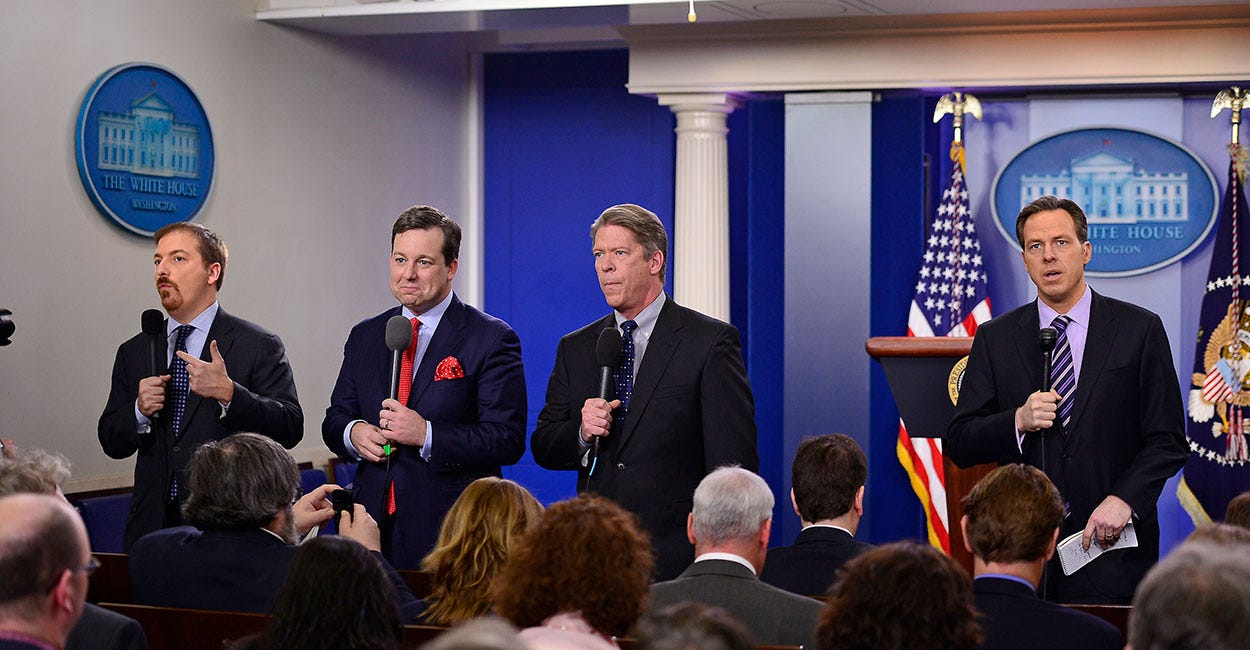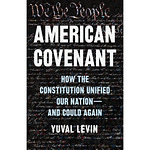This is my third post on Neil Postman’s book Amusing Ourselves to Death: Public Discourse in the Age of Show Business. The first post on why I’m re-reading it is here. The second, on how this book is the OG Red Pill, is here.
In July, I went through Aurelian Craiutu’s Why Not Moderation?: Letters to Young Radicals
In June, I went through Yuval Levin's American Covenant
In May, I went through Taylor Branch’s At Canaan’s Edge
In April, I went through John Inazu's book Learning to Disagree.
In March, I went through Mustafa Suleyman’s The Coming Wave.
In February, I went through Nick Troiano’s The Primary Solution.
In January, I went through Michael Wear’s The Spirit of Our Politics.
The book of the month schedule is here.
Major Garrett is chief Washington correspondent for CBS News, and as he told me in our conversation, he is an "accidental television journalist" who "never imagined" working in TV and "never wanted it." He was a print reporter for 17 years before entering the world of television. Since then, he's proven to be one of the most formidable, best prepared interviewers in journalism. This dude is rigorous, smart, and fun! And you know what? Damn it, he cares. He cares about this country. He cares about great journalism. He cares about writing. He cares about politics. And he cares about people. He's been doing one of the best podcasts around for a while now, The Takeout, in which he asks some of the best news makers around to name their favorite spot to eat lunch and then he interviews them here.
Major is the author of five books, including The Big Truth: Upholding Democracy in the Age of the Big Lie, and Mr. Trump's Wild Ride: The Thrills, Chills, Screams, and Occasional Blackouts of an Extraordinary Presidency.
Major read Amusing Ourselves to Death in the 1990's, as did I. He was a print reporter when he read it. I hadn't yet entered the profession when I did. He then soon after became a TV reporter for CNN, where he spent two years before moving to the then-nascent Fox News, where he became a Washington fixture as White House correspondent. That's where he was when I met him during my time as a White House correspondent for The Washington Times.

But then in 2009, Major left TV behind, going back to writing. He departed Fox News for a job writing longer magazine stories for National Journal. After two years of writing full time, Major went back to TV, this time with CBS News. And he's been there since, for over a decade now.
I was glad, as I told him, that Major has a textured view of Postman's work. I didn't want a cheerleader. But Major talks about the impact of the work on him, his views of its shortcomings, and its lasting value.
Here's a partial transcript of our conversation, lightly edited for clarity and brevity. The full interview can be heard in the audio above, as part of The Long Game podcast, which is available on most major podcast platforms.
Jon Ward: What is a journalist? What's the first word that comes to mind and then expand at your pleasure.
Major Garrett: A journalist is someone who typically, and certainly in my career, has worked for a journalistic organization in pursuit of facts and who is directed toward accuracy above every other consideration, every other consideration. If you are not accurate, if you are not devoted to the pursuit of verifiable facts and the collection and explication thereof, you're not a journalist, and I tell young reporters all the time, you cannot be successful if you are not religiously devoted to accuracy. You just can't. You can be many other things. You can have a following. You might make some money, you might achieve a kind of pseudo prominence, but you won't be a successful journalist and you won't enjoy the durability of good journalism. I have a phrase. It's kind of my own and it goes like this. Credible journalism will always outlast in credible politicians, and I mean incredible, not sensational, I mean lacking credibility.
I don't mean that happens instantly. I mean that happens over time because facts don't change. Commentary and perspectives from politicians change all the time, and embellishment — lying, propagandistic tendencies of political figures — come and go. But the durability of things that happened and are verified and can be pinned down not only stand the test of time, but can refute exaggerations, propaganda, lies, misinformation and the like. And I really don't know of any better long-term pursuit for a way to orient your life. It's been the way I've oriented my life since I became a working journalist in 1984. I don't really know how to do anything else and I can't imagine doing anything else.
Jon Ward: How has TV news changed? How long have you been in the game? How has it changed in your time?
Major Garrett: For people who don't know, I'm an accidental television journalist. By that I mean I never pursued it. I never imagined it. I never craved for it. I never wanted it. As you know, I spent 17 years as a print reporter before television ever came in my direction. I started my career in Amarillo, Texas as a morning police reporter for the Amarillo Globe News. Then I went to the Las Vegas Review Journal newspaper, then I went to the Houston Post. I'm happy to say the first two of those newspapers still are in existence. Shells of their former selves, but still here. The Houston Post isn't. The Houston Post died an inglorious business-driven death in the mid nineties. And I worked in Washington as a print reporter for The Washington Times.
Jon Ward: My alma mater.
Major Garrett: Yes indeed. Then I was at the US News and World Report. I've written five books. My sensibilities have always been in the print space. Television came my way in 2000 quite by accident when CNN hired me. So my first television job was covering the White House for CNN. Let us just say that is a non-typical approach to television journalism, your first job is standing on the north lawn of the White House for a global news network like CNN.
So as I got into television, I always thought in the back of my mind, 'Well, if this doesn't work out, I'll go back to print. I have a perfectly well-formed life there.' To whatever strength or weakness I've tried to bring — print sensibilities — to my approach to television, that has limited utility. You can't be a television reporter and talk like a newspaper or magazine writer. I learned that right out of the shoot. And I've often joked that if I had to watch those early live shots for CNN, I do believe I could place some sort of complaint before the United Nations for human rights violation of some kind.
But that doesn't mean you can't bring the rigor of print journalism to television journalism. And I've tried to do that.
How has television journalism changed? Well, how has journalism changed? The audience has become more fractured. The audience has become more ideological and therefore wants it's preferences attended to in ways that simply weren't true when I was growing up. And the barrier to entry to something that looks like television is completely flattened. So all sorts of people look like they're on television when they're not on television because they're on the internet. And studios aren't studios anymore and cameras aren't cameras anymore. You can literally make yourself look like you're presenting a television program without any of the things that used to be required to put on a television program. I'm not saying that's necessarily good or bad, it's just a vast change. And with everyone having a video component in their phone and almost everyone having a phone, everyone can be a citizen journalist.
Everyone can be a citizen director. Everyone can be a citizen producer. Everyone can be a citizen actor or actress. So everyone has an entertainment space for themselves with them all the time. That has taken some of the awe inspiring value of television news away from it, stripped it away.
Jon Ward: And power.
Major Garrett: When we were young, yes, there were things about television journalism that slackened one's jaw. You're like, 'Wow, I'm seeing this thing live from across the world in real time. That's an amazing thing. How do they do that?' No one thinks that anymore. All of that awe and technological innovation and cost barrier — meaning, 'Guess what? Not everyone can do that. Hardly anyone else can do it but us, and we're here and we've made the effort and made the financial commitment to bring this information to you — that uniqueness also brought — to the word you just used — power, enormous power. That power has been siphoned away considerably as well.
Jon Ward: When did you first read Neil Postman, Amusing Ourselves to Death?
Major Garrett: In the early nineties. Okay. It's been a long time, and I wasn't in television then, so I was, trust me, I was much more, 'Yeah! Yeah! Those guys! That's all awful!!' Now ... I admire the book tremendously. Now I just have a different perspective, a lived perspective on it now. And look, the key word in the book is the last word of the title1, death. Not Dying. It's a spiritual death. It's an intellectual death. It is the cost, the accumulated cultural cost and analytical cost of amusement. We're not dying. But the things that Neil Postman raises about a video world, and its emotional weight and its ephemeral tendencies or qualities, have only been enlarged by things that are not television, but that are video driven.
Postman writes about the dangers of people spending inordinate amount of hours sitting somewhere watching a television. He could not imagine a universe in which you could go into a large airport in which you would encounter thousands and thousands of people and see almost every single one of them hunched over their phone, with their neck craned in a more than mildly uncomfortable arc, to scroll through endless arrays of videos. That's kind of the apotheosis of what he's worrying about here, and it was unimaginable to Neil Postman then, but it is a continuation of what he was warning us about, which is the addictive nature of amusement.
Jon Ward: Well, I'm glad that you sort of came out of the gate with some mildly critical comments of Postman. I'm glad that you have sort some push back for the book.
Major Garrett: I do. There is some part of it that is almost adorably quaint. There's a whole section about, 'We don't consume information the way audiences were capable of and willing to during the Lincoln Douglas debates.' Guess what? No kidding. Television didn't generate that. Radio didn't generate that. The telegraph, as he argues, probably did, but that was inevitable and it is useful. It is an intellectually rigorous exercise to imagine a time when people did, as he writes, show up in numbers of thousands to listen to a three hour lecture and follow lecturers around the country kind of rock concert style. That's interesting. It's also an antique.
Jon Ward: Well, and also Americans slaughtered each other two years later. A more literate, thoughtful society didn't stop that.
Major Garrett: Didn't stop that. Not even close. Yeah. The other central flaw with the book, and it's a flaw that wasn't even imaginable to Neil Postman at the time, is that he misses one of the great cruelties of this problem with amusement and television. He misses entirely the fact that it was dominated entirely — around the time he was writing this book — by white men, as the entire universe of television was. Now, if someone had raised that criticism when this book was published in the mid eighties, they would've been dismissed as some part of the kooky faculty lounge that occupied the fringes of American academic life talking about, 'Hey, wait a minute, representation matters. Visualization of ethnicities in this country matters. Voices of women, of all ethnicities matter, and they're invisible in this massively powerful medium.' Neil missed that, as anyone of this time would've missed it, but that doesn't mean ... it's not a void. If you're talking about the most powerful new medium and it is dominated by one monoculture in America, that's a problem, and he misses that.
Jon Ward: So what is the core value to you of this book? Because we are coming to this conversation as fans of the book.
Major Garrett. Yes we are. Despite its small flaws, it makes a large and powerful argument that there is an intellectual, a spiritual, a kind of humanistic danger to trivializing your lives through a medium that collapses the time space continuum, makes things appear as they aren't in real life, shaves away or pulverizes nuance, context, clarity at times, and hyper simplifies things to a way that makes the human reaction invariably more emotional and less rational. All of those things are true. It's a large cautionary tale, and that's its permanent value.
Major referred to it in the audio as “subtitle” but I corrected it in this edited transcript, for accuracy.












Share this post